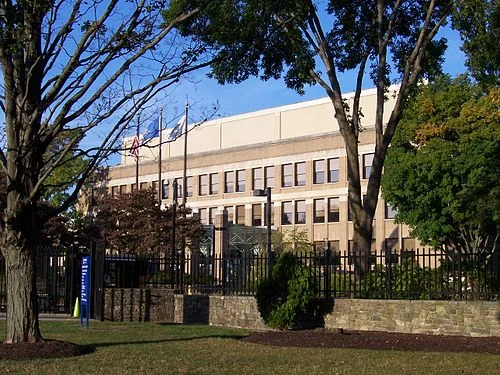Chris Powell: No state is big enough to hold back a big business
Headquarters of United Technologies Pratt & Whitney unit, in East Hartford, Conn.
Connecticut has been more surprised than it should have been by the announcement from United Technologies Corp. that upon its merger with Raytheon Co. it will move its headquarters from Farmington to Raytheon's outside Boston, in Waltham.
As much as some politicians feared and others hoped that the move was prompted by the state's awful economic conditions, it wasn't. Rather the move was just another natural step in the evolution of a company that began a century ago as the Pratt & Whitney machine tool shop in Hartford.
The tool shop became a manufacturer of aircraft engines, merged with the predecessor of Boeing to become United Aircraft and Transport Corp., started making airplanes as well as their engines, was broken up by New Deal-era antitrust legislation, kept growing anyway, and became a conglomerate -- United Technologies -- that was heavily dependent on government contracts. As such UTC came to need political support outside Connecticut, so it diversified operations into other states and even other countries.
As a result UTC's employment in Connecticut, around 19,000, has declined to a fraction of what it was a few decades ago, and state government could have done little to prevent it. For these days no conglomerates and big government contractors are going to stick to one state. It's not just their need for national political influence for securing federal government business. It's also to avoid becoming hostage to any one predatory state government.
So Connecticut's economic future does not depend on the big companies already here. For the same reasons motivating UTC, they are more likely to expand out of state. Instead Connecticut's economic future depends on growth by smaller companies already here and entry here by companies elsewhere.
But good luck drawing or keeping anyone here while the most important thing state government has to offer anyone is the duty to share the burden of $70 billion or so in unfunded state and municipal employee retirement obligations -- that is, the duty to pay more in taxes every year [ITALICS] forever [END ITALICS] to sustain a pension-and-benefit society.
xxx
SLUSH FUND MAY EXPLAIN IT: Maybe there's a good case for giving an exemption from state freedom-of-information and ethics laws to the Partnership for Connecticut, the entity just created by billionaires Ray and Barbara Dalio and state government in the name of improving public education. The Dalios are donating $100 million, state government is appropriating an equal amount, and more donations will be sought from other wealthy people.
But if there is a good case for the exemption, nobody is making it.
Spokeswomen for Governor Lamont and the Dalios insist that the partnership should be exempt from the accountability laws because it's not really a state agency. But it was created and funded by the new state budget, a majority of its board will be state officials, and it will dispense public money to public schools. Private entities don't need any provision in the state budget exempting them from FOI and ethics laws, since those laws apply only to government agencies.
So the budget writers thought the partnership would be considered a state agency subject to the accountability laws unless another law asserted, against the evidence, that it wasn’t a state agency.
Why did the budget bestow such an exemption and exactly who asked for it and why? The spokeswomen for the governor and the Dalios were asked about this more than a week ago but have declined to provide an answer. So here's a guess: The partnership will make a great slush fund.
Chris Powell is a columnist for the Journal Inquirer, in Manchester, Conn.
